North Carolina Central University: No Ordinary, Common Barnyard Fowl
“That audacious belief of our people – that in most ordinary men and women there reside the most extraordinary possibilities, and that, if... Read More
“It has been my honor to serve as guiding steward of the Hayti Heritage Center, a cultural treasure rooted in the Hayti community. The Foundation has provided quality arts programming for nearly 50 years while preserving the incredible heritage of a historic venue that dates back to 1891. The city is enriched by the Hayti Heritage Center, [one of] the last remaining original structure[s] from Durham’s iconic Black Wall Street district.” - Angela Lee, Executive & Artistic Director of Hayti Heritage Center
Posted By Kyesha Jennings on Jun 05, 2024
Housed within the original site of the historic St. Joseph AME church, Hayti Heritage Center is a multi-purpose cultural arts center inspired by the legacy of Durham’s prominent Black leaders and the cultural significance of the Hayti community. From the late 19th century until the 1940s, the Hayti District was prosperous both socially and economically, garnering a reputation as “The Black Capitol of the South.”
By the 1960s, desegregation and Durham’s Urban Renewal Project were the primary causes of Hayti’s decline. The construction of Highway 147 and subsequent urban renewal initiatives in Durham had a profound impact, resulting in the displacement or disruption of over 4,000 homes and 500 Black-owned businesses, significantly altering the landscape and socioeconomic foundation of the community. Despite the upheaval of urban renewal, St. Joseph AME Church survived—today, it is one of Hayti's oldest original structures.
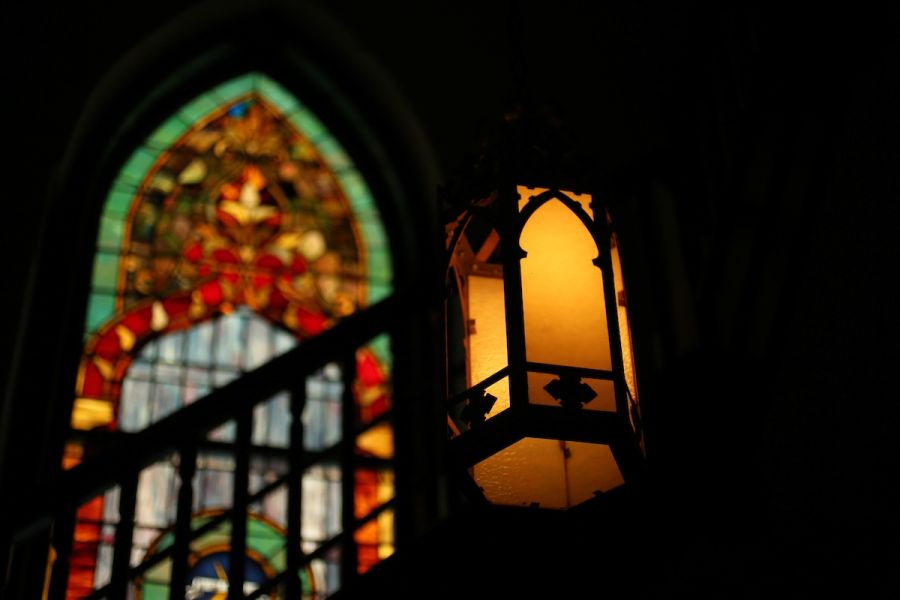
St. Joseph's Performance Hall was once the sanctuary of St. Joseph's AME Church. Photo: SP Murray / Discover Durham
Under the stewardship of The St. Joseph’s Historic Foundation, Inc. (SJHF), in 1975 the Hayti Heritage Center was established. The facility serves as a hub for cultural enrichment and arts education, dedicated to fostering cultural understanding through a variety of events, activities and programs. Its mission is to preserve the heritage and celebrate the experiences of African Americans through diverse initiatives, ensuring their stories and contributions are cherished and shared.
There are very few places like the Hayti Heritage Center. For many Durham residents, the Hayti Heritage Center serves as a second home. The sacred space provides a direct connection to Durham’s Black history through the arts. The center also provides a sense of belonging to the community and has inspired and influenced generations of creatives. Built in 1891, the red brick building exudes a timeless elegance with its Gothic Revival style. Crafted from sturdy masonry brick, visitors encounter a blend of historical and diasporic reverence. The Hayti Heritage Center’s main floor features the St. Joseph’s Performance Hall, the Lyda Moore Merrick Art Gallery, and the Claronelle K. Trapp Brown Community Room.
Lyda Moore Merrick was the daughter of Dr. Aaron Moore, founder of North Carolina Mutual Insurance Company and Durham’s first Black physician, and the wife of Ed Merrick, son of John Merrick, entrepreneur and NC Mutual founder and first president. Merrick was a passionate supporter of individuals with visual impairments, notably establishing The Merrick/Washington Magazine for the Blind, a renowned national publication dedicated to addressing the specific needs of Black individuals with visual challenges. Merrick and her daughter, Mrs. Lyda Constance Merrick Watts, helped stop the demolition of St. Joseph’s AME Church, making the church one of the last buildings standing from Durham’s unfulfilled promise of urban renewal.
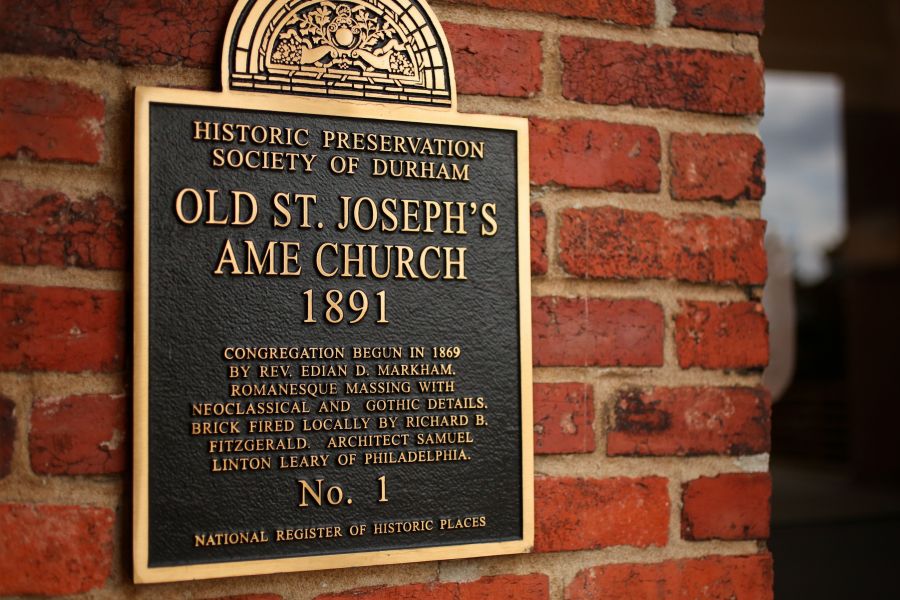
St. Joseph's AME Church still stands today thanks to the efforts of Lyda Moore Merrick and her daughter, Lyda Constance Merrick Watts. Photo: SP Murray
Mrs. Claronelle K. Trapp Brown was a working-class activist and socialite revered within the St. Joseph AME church community, was known for helping to keep the Hayti community together. She was the wife of Dr. Eldee L. Brown, Sr., the first African-American licensed Chiropractic physician in North Carolina.
Today, with over 40,000 visitors each year, The St. Joseph’s Performance Hall hosts a variety of musical performances and events, while the Lyda Moore Merrick Art Gallery provides a platform for local and regional artists to showcase their work. The Claronelle K. Trapp Brown Community Room serves as a hub for community gatherings, receptions, dinners, art exhibitions, markets and the Hayti Heritage Film Festival.
On the second floor, visitors have access to the balcony of the performance hall, two classrooms that provide space for educational programming and the historic dance studio where visitors can take yoga as well as ballet and African dance classes. The balcony of the performance hall offers a unique perspective on events below and was added during the 1999 restoration of the building by the Freelon Group, an award-winning Durham-based architect firm. The dance studio, named in honor of Baba Chuck Davis, pays homage to his legacy as the founder of the African American Dance Ensemble, which found its home within these walls. Together, these spaces embody the Hayti Heritage Center's mission to celebrate, preserve and share the rich cultural heritage of Durham's African American community.
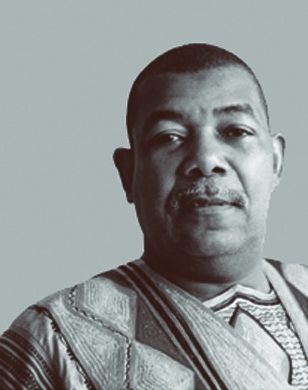
The dance studio at the Hayti Heritage Center is named after Baba Chuck Davis. Photo: Durham County Library Historical Photo Collection
On the second floor, visitors can also view a recreation of a mural originally painted in 1999 in the Heritage Square Shopping Center near the center. An effort was made to preserve the memory of this mural, which tells the story of the original Hayti neighborhood and its people, before the shopping center is developed.
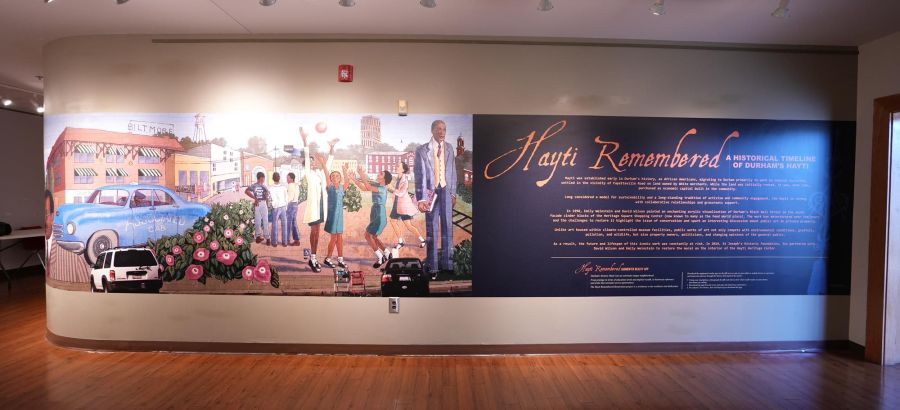
The Hayti Remembered Mural is a recreation of the original mural, which tells the story of Durham's Hayti neighborhood. Photo: Discover Durham
Founded by Edian Markham, a remarkable African Methodist Episcopal (AME) missionary and former enslaved person, St. Joseph's Church, humble beginnings dates back to 1868. The church, originally named Union Bethel Church, initially took form as a simple 'Brush Arbor,' constructed with four posts, boards, and branches. As the congregation flourished, so did their aspirations for a more permanent place of worship. Guided by successive leaders like Rev. George Hunter and Rev. WD Cook, the church saw the transition from log and frame structures to the grandeur of a brick edifice.
This monumental shift culminated in 1891 under the visionary leadership of Rev. Andrew Chambers, who spearheaded a successful fundraising campaign. Generous contributions from both the African-American and white communities, including notable figures like John Merrick, Washington Duke, and Julian Carr, propelled the realization of a long-held dream. As the new brick church emerged, christened as St. Joseph Church, it not only symbolized a physical transformation but also stood as a beacon of hope and solidarity, embodying the spirit of unity and resilience that defined its history.
By the late 19th century, Durham had emerged as a thriving industrial center, with tobacco factories lining its streets. St. Joseph AME Church was the foundation of Hayti as it provided access to spiritual life and contributed to the neighborhood's growth. Within this landscape, the Hayti community flourished, becoming a vital center of African American life and culture and one of the nation's most successful self-sufficient Black communities long before urban renewal and intentional disinvestment of Black neighborhoods.
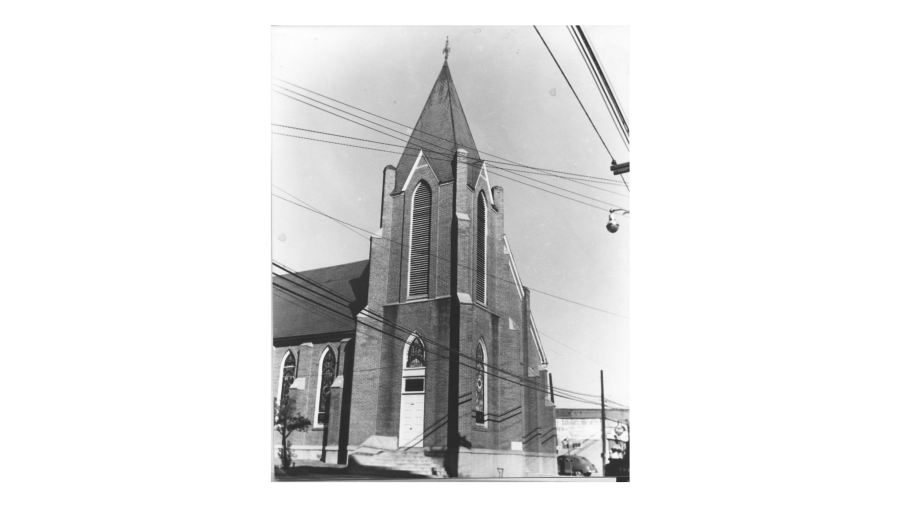
The church you see today has stood as a pillar of strength and solidarity for over 100 years. Photo: Durham County Library Historical Photo Collection
During the era of Jim Crow laws, St. Joseph's served as more than just a place of worship; it became a sanctuary where African Americans could find solace, strength and solidarity. The church played a pivotal role in the civil rights movement, offering a space for organizing, strategizing, and mobilizing for change. Its members, inspired by their faith and fueled by a desire for justice, actively participated in marches, sit-ins and protests aimed at dismantling racial segregation and inequality.
Historically steeped in faith and activism, St. Joseph's remains a symbol of strength and inspiration for Durham and beyond. The programming offered by the center reflects this legacy, embodying the spirit of resilience and empowerment that defines the church's heritage.
With a commitment to prioritizing Black voices and Black history, The Hayti Heritage Film Festival takes place during the first week of March every year and is one of the longest running Black film festivals in the southeast. Since 1994, festivalgoers have been able to indulge in a curated selection of films celebrating African American culture, history, and storytelling. From thought-provoking documentaries to captivating narratives, the festival offers a platform for emerging filmmakers as well as established voices to showcase their work and engage audiences in meaningful dialogue.
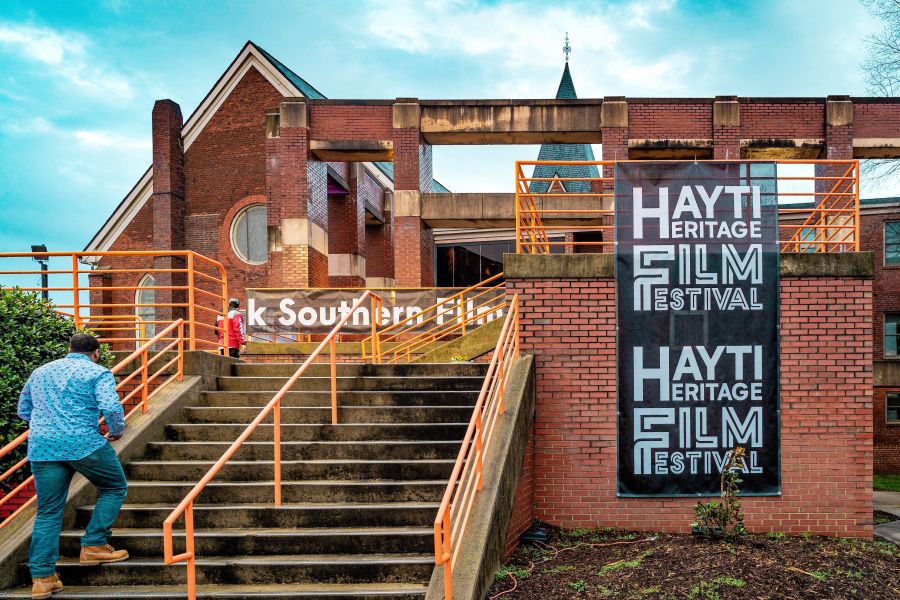
Head to the Hayti Heritage Film Festival in the Spring for a unique and rewarding film experience. Photo: Discover Durham
Presented by Be Connected Durham, Hayti Heritage Center offers 3rd Friday Live from the Fayetteville Street Corridor. An expansion of Downton Durham’s 3rd Friday series that aims to bring art exhibitions, music and culture beyond Main Street to Fayetteville Street. “3rd Friday Live is designed to engage our community through the arts and culture in an equitable way, a way that says you belong here and while you’re here, here are Black artists you may not know, but they are dope and here in Durham in the way that James Baldwin and Zora Neale Hurston was,” says Angel Dozier, founder of Be Connected Durham.
Jambalaya Soul Slam is the Triangle’s longest-running poetry event and is hosted monthly at Hayti Heritage Center every third Saturday. Poetry takes center stage at the Jambalaya Soul Slam, an electrifying spoken word competition that celebrates the power of language and expression. Poets from diverse backgrounds compete for the title of Slam Champion, delivering impassioned performances that captivate audiences with their raw emotion and lyrical prowess. The event fosters a supportive community of artists and provides a platform for voices often marginalized in mainstream spaces.
In keeping with the center's mission to showcase black American musical traditions, the Hayti Heritage Center presents the Black American Music Series monthly, every second Sunday. This ongoing concert series features performances spanning genres such as jazz, gospel, R&B and hip-hop, highlighting the enduring legacy of Black music and its profound impact on global culture. From intimate solo recitals to lively ensemble performances, the series offers something for every musical palate.
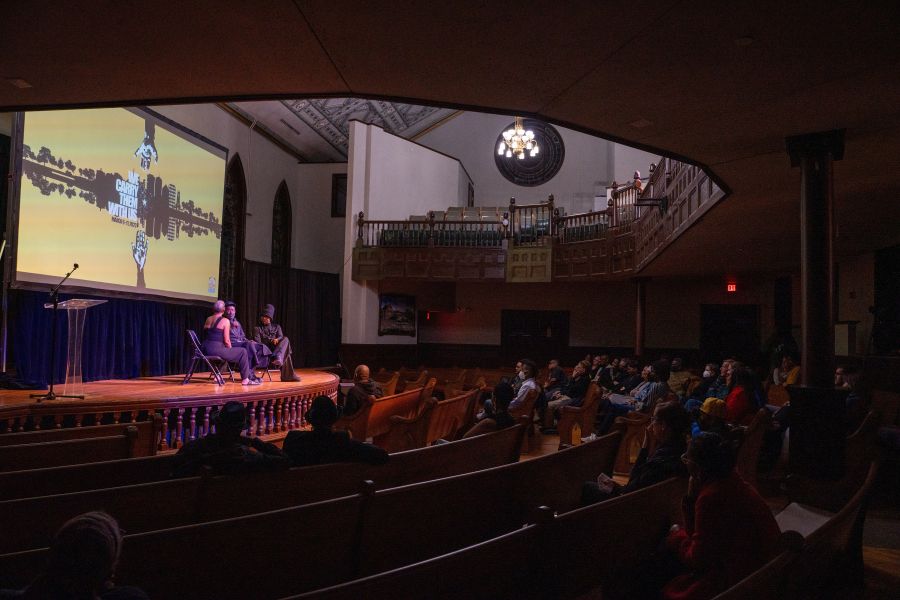
Whether it's music, poetry, visual art or film you seek, the Hayti Heritage Center provides a platform for all forms of Black art. Photo: Discover Durham
The Hayti Heritage Center also invites individuals of all ages and skill levels to unleash their creativity on the dance floor through a variety of classes and workshops. From traditional African dance to contemporary styles influenced by hip-hop and jazz or Black and Brown ballet, the center offers a diverse range of dance experiences led by experienced instructors. Whether seeking to refine technique, cultivate rhythm, or simply enjoy the joy of movement, participants find inspiration and community in these dynamic classes.
African Dance is hosted on Monday evenings from 6:30 – 7:30pm, Black and Brown Ballet is offered on Tuesdays from 6:30 – 8pm, and Soul Flow Yogo are on Wednesdays from 6:30 – 8pm. On Saturdays, hosted by SA-TO'S Dance Academy, visitors can sign up for a wide range of dance styles including African, Jazz Movements, Contemporary and Hip-Hop, or they can learn to play the African drums with instructor Teli Shabu, an accomplished musician.
If dancing is not a core skill, no worries; Hayti offers a robust humanities-centered book club called Hayti Lit. The group meets every fourth Thursday to discuss the themes that occur in classic works by Black authors, supported by facilitators and highlighted with discussions, readings, and performances from each work.
In essence, the programming offered at the Hayti Heritage Center serves as a unique blend of artistic expression, community engagement and cultural celebration. Through its diverse offerings, the center continues to honor and preserve the rich heritage of African American culture while fostering creativity, dialogue and connection among individuals from all walks of life.
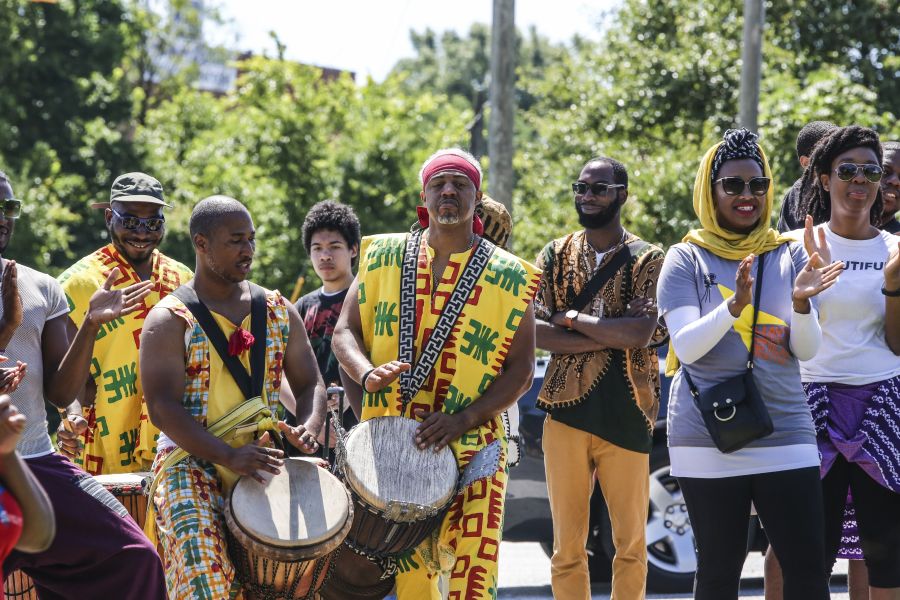
From the Juneteenth processional to its monthly programming, the Hayti Heritage Center celebrates Black culture. Photo: Keenan Hairston
The public walking tours offered by the Hayti Heritage Center are more than just strolls through historic streets. Led by teaching artist Aya Shabu, the tours are immersive journeys into the heart of Durham's vibrant past, connecting both locals and visitors to the history of the Hayti neighborhood. With each step, participants are transported back in time, gaining insights into the cultural, social, and economic significance of this iconic area. This shared exploration of the neighborhood's legacy not only educates but also inspires a sense of belonging and pride among attendees.
Moreover, these walking tours play a crucial role in preserving Hayti's legacy for future generations. By engaging with the community and visitors alike, the Hayti Heritage Center ensures that the neighborhood's history remains alive and relevant. Through dialogue, education, and cultural exchange, the tours contribute to a deeper understanding of Durham's identity and evolution.
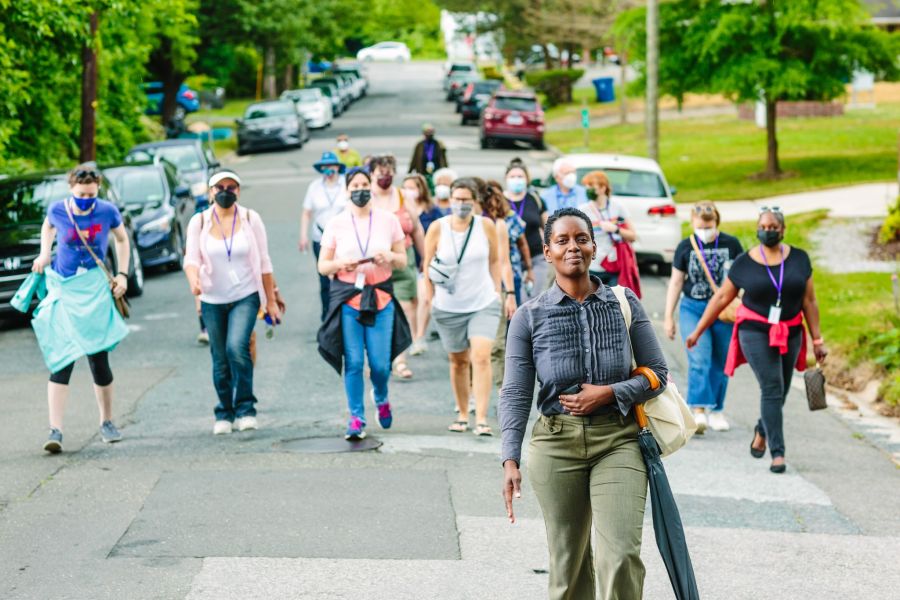
Learn about the history of Durham's historically Black neighborhoods with Aya Shabu. Photo: Aya Shabu
In essence, the public walking tours offered by the Hayti Heritage Center transcend mere sightseeing. As participants walk side by side through the streets of Hayti, they not only witness history but become active participants in its ongoing legacy.
Plan Your Visit to the Hayti Heritage Center:
Location: 804 Old Fayetteville St.
Hours: Monday - Friday, 10 a.m. - 5 p.m.; Saturday, 9 a.m. - 5 p.m.; additional hours during special events.
Accessibility: The Center is accessible to all, including those with mobility challenges. Check with the Hayti Heritage Center directly for any specific needs.
Admission: Some events and programming are ticketed, though general admission to the center is free.
Plan Your Visit: For more programming and information, visit hayti.org.
North Carolina Central University: No Ordinary, Common Barnyard Fowl
“That audacious belief of our people – that in most ordinary men and women there reside the most extraordinary possibilities, and that, if... Read More
Durham's Creative Soul: Exploring the Vibrant Black Arts Scene
Welcome to Durham's Black artist scene. Here, every brushstroke tells a story, every lyric resonates with truth and every performance... Read More